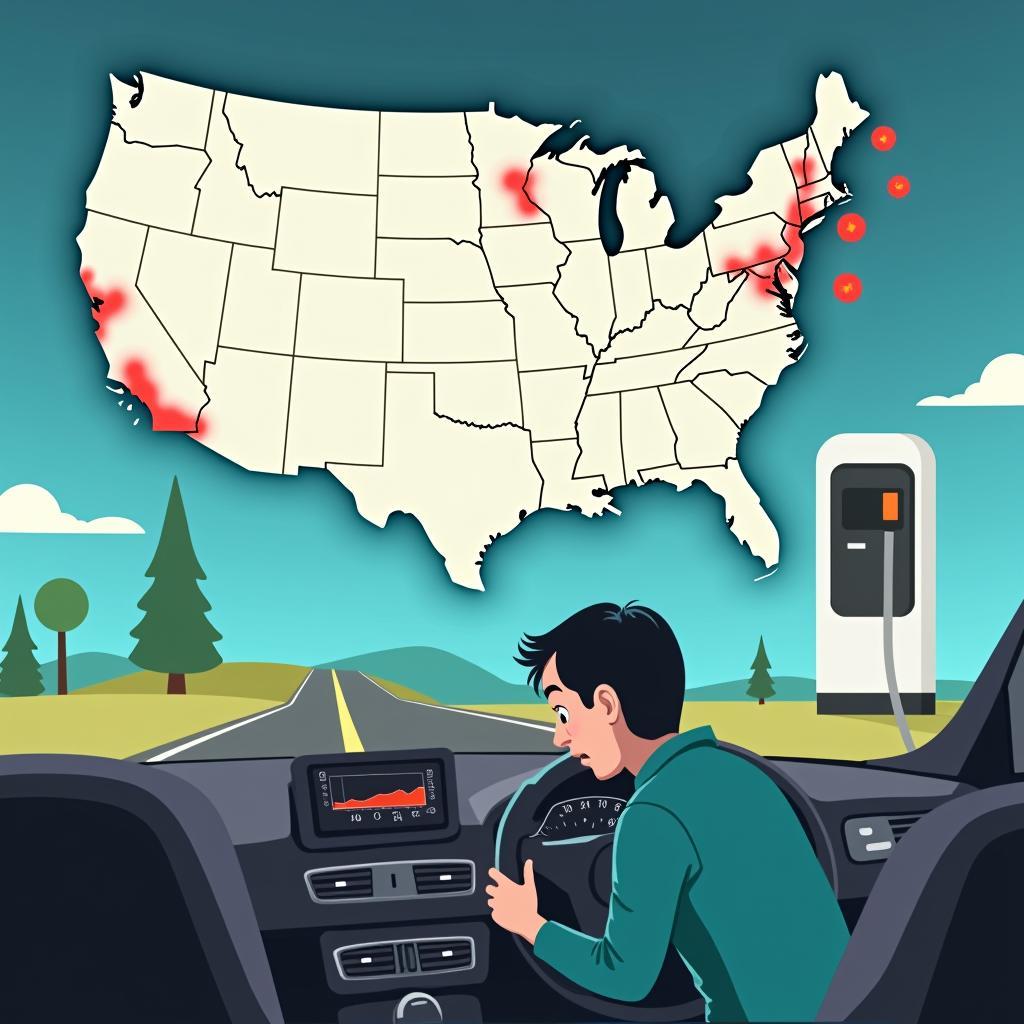Electric vehicles (EVs) are revolutionizing the automotive industry, offering a cleaner and more sustainable mode of transportation. However, despite their growing popularity, several key challenges remain. This article addresses The 10 Biggest Problems With Electric Cars, offering insights for owners, repair shops, and technicians alike.
Similar to what’s the problem with electric cars, one of the primary concerns revolves around range anxiety.
Range Anxiety and Charging Infrastructure
One of the most significant hurdles for EV adoption is range anxiety, the fear of running out of charge before reaching a charging station. Limited range compared to gasoline-powered vehicles, coupled with a still-developing charging infrastructure, contributes to this concern. Finding available and reliable charging stations, especially during long trips, can be a challenge. While the number of public chargers is increasing, uneven distribution and varying charging speeds pose ongoing issues.
 Electric Vehicle Range Anxiety Challenges
Electric Vehicle Range Anxiety Challenges
Battery Life and Degradation
EV batteries have a limited lifespan and are prone to degradation over time, affecting their capacity and overall performance. Extreme temperatures, frequent fast charging, and high usage can accelerate this degradation. Replacing an EV battery can be a substantial expense, impacting the overall cost of ownership.
Purchase Price and Affordability
Although government incentives are available in some regions, the initial purchase price of an EV is generally higher than comparable gasoline-powered vehicles. This price difference can be a barrier for many potential buyers, limiting wider adoption. The cost of battery replacement also adds to the long-term financial burden.
This issue also resonates with problems with switching to electric cars, highlighting the financial implications of adopting this new technology.
Charging Time
While fast charging stations are becoming more prevalent, charging an EV still takes significantly longer than filling a gas tank. This can be inconvenient for long journeys and necessitates careful planning and time management. Even with fast charging, a full charge can still take a considerable amount of time, depending on the vehicle and charger.
Electricity Grid Capacity and Reliability
The increasing adoption of EVs puts a strain on existing electricity grids. As more EVs are charged simultaneously, the grid’s capacity may be challenged, particularly during peak hours. Grid reliability and potential power outages are concerns that need to be addressed to support widespread EV usage.
Environmental Impact of Battery Production
The production of EV batteries involves the extraction and processing of various raw materials, including lithium, cobalt, and nickel. These processes can have significant environmental impacts, such as mining pollution and habitat destruction. Ensuring ethical and sustainable sourcing of these materials is crucial for minimizing the overall environmental footprint of EVs.
These environmental concerns are discussed further in problems with driving cars, which explores the broader impact of automobiles on the environment.
Limited Model Availability and Variety
Compared to the wide range of gasoline-powered vehicles available, the selection of EV models is still relatively limited. While the market is expanding, consumer choices in terms of body styles, features, and price points are not as diverse.
Resale Value Uncertainty
The long-term resale value of EVs is still somewhat uncertain due to factors like battery degradation and evolving technology. This uncertainty can make it more challenging to secure financing or obtain favorable trade-in values.
Maintenance and Repair Challenges
While EVs generally require less routine maintenance than gasoline-powered cars, specialized training and equipment are needed for repairs, particularly for battery-related issues. The availability of qualified technicians and specialized repair facilities is still limited, which can make servicing EVs more challenging and potentially expensive.
This technical aspect aligns with what is the main problem with electric cars, which delves deeper into the core challenges associated with electric vehicles.
Performance in Extreme Weather Conditions
Extreme cold or hot temperatures can significantly impact EV battery performance and range. Cold weather can reduce battery capacity, while extreme heat can also negatively affect battery life and efficiency. This can limit the usability of EVs in certain climates and requires specific strategies for managing battery performance in extreme weather.
“One of the most common misunderstandings about EVs is their maintenance needs. While they have fewer moving parts than combustion engines, specialized knowledge is essential for servicing high-voltage systems and batteries,” says Robert Johnson, Senior EV Technician at Future Auto Solutions.
 Electric Vehicle Performance in Winter Conditions
Electric Vehicle Performance in Winter Conditions
In conclusion, while electric cars offer numerous advantages, including reduced emissions and lower running costs, several significant challenges remain. Addressing issues like range anxiety, charging infrastructure, battery technology, and affordability is crucial for accelerating the widespread adoption of EVs. For further assistance and expert advice on EV maintenance and repair, connect with AutoTipPro at +1 (641) 206-8880 or visit our office at 500 N St Mary’s St, San Antonio, TX 78205, United States.
This echoes the challenges faced by other alternative fuel vehicles, as discussed in hydrogen car problems.




Leave a Reply